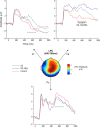Brain Responses at Encoding Predict Limited Verbal Memory Retrieval by Persons with Schizophrenia
- PMID: 28961775
- PMCID: PMC6322831
- DOI: 10.1093/arclin/acx082
Brain Responses at Encoding Predict Limited Verbal Memory Retrieval by Persons with Schizophrenia
Abstract
Objective: Special attention has been given to verbal memory deficits in schizophrenia because they are apparent in healthy biological relatives of affected individuals, indicating a link to genetic risk for the disorder. Despite a growing consensus that encoding abnormalities contribute to poor verbal memory in the disorder, few studies have directly examined how neural responses during encoding contribute to later memory performance.
Method: We evaluated event-related potentials (ERPs) during encoding of verbal material by patients with schizophrenia, healthy first-degree biological relatives of patients, and healthy controls. The extent to which N1, N400, and anterior and parietal Late Positive Components (LPCs) explained encoding accuracy and later memory of material was investigated.
Results: Encoding accuracy was associated with asymmetry in anterior LPCs toward right frontal brain regions and was most evident in relatives. N1 was abnormal at encoding in schizophrenia and differentially accounted for later memory performance. In controls better recall of verbal material was predicted by a larger early occipital (N1) encoding response; however, in patients with schizophrenia smaller N1 encoding responses were related to better recall. Interestingly, better recognition of verbal material across groups was also predicted by smaller N1 amplitudes during encoding of word stimuli.
Conclusion: Separable patterns of electrophysiological response during encoding appear to differentially support recall and recognition of material from memory. Similar patterns of electrophysiological response across patient and relative groups suggest that those who carry genetic liability for schizophrenia share deviations in the neural activity related to encoding of material into episodic memory.
Figures



Similar articles
-
Verbal memory processes in schizophrenia patients and biological relatives of schizophrenia patients: intact implicit memory, impaired explicit recollection.Schizophr Res. 2004 Dec 1;71(2-3):339-48. doi: 10.1016/j.schres.2004.04.008. Schizophr Res. 2004. PMID: 15474904
-
Relational memory function in schizophrenia: Electrophysiological evidence for early perceptual and late associative abnormalities.Schizophr Res. 2023 Apr;254:99-108. doi: 10.1016/j.schres.2023.02.019. Epub 2023 Feb 21. Schizophr Res. 2023. PMID: 36821940
-
Evidence for a differential contribution of early perceptual and late cognitive processes during encoding to episodic memory impairment in schizophrenia.World J Biol Psychiatry. 2017 Aug;18(5):369-381. doi: 10.1080/15622975.2016.1208839. Epub 2016 Aug 30. World J Biol Psychiatry. 2017. PMID: 27573041
-
Declarative memory in unaffected adult relatives of patients with schizophrenia: a systematic review and meta-analysis.Schizophr Res. 2005 Oct 1;78(1):13-26. doi: 10.1016/j.schres.2005.05.018. Schizophr Res. 2005. PMID: 16006102
-
Verbal declarative memory dysfunction in schizophrenia: from clinical assessment to genetics and brain mechanisms.Neuropsychol Rev. 2003 Jun;13(2):43-77. doi: 10.1023/a:1023870821631. Neuropsychol Rev. 2003. PMID: 12887039 Review.
Cited by
-
Inefficient Attentional Control Explains Verbal-Memory Deficits Among Military Veterans With Posttraumatic Reexperiencing Symptoms.Clin Psychol Sci. 2022 May;10(3):499-513. doi: 10.1177/21677026211025018. Epub 2021 Jul 7. Clin Psychol Sci. 2022. PMID: 38020495 Free PMC article.
-
Personality traits across the psychosis spectrum: A Hierarchical Taxonomy of Psychopathology conceptualization of clinical symptomatology.Personal Ment Health. 2020 Feb;14(1):88-105. doi: 10.1002/pmh.1448. Epub 2019 Jul 15. Personal Ment Health. 2020. PMID: 31309736 Free PMC article.
References
-
- Allen J. (2002). The role of psychophysiology in clinical assessment: ERPs in the evaluation of memory. Psychophysiology, 39, 261–280. https://doi.org/10.1017.S0048577201393034. - PubMed
-
- American Psychiatric Association (2000). Diagnostic and statistical manual of mental disorders, Text Revision (DSM-IV-TR) (4th ed.).
MeSH terms
Grants and funding
LinkOut - more resources
Full Text Sources
Other Literature Sources
Medical

